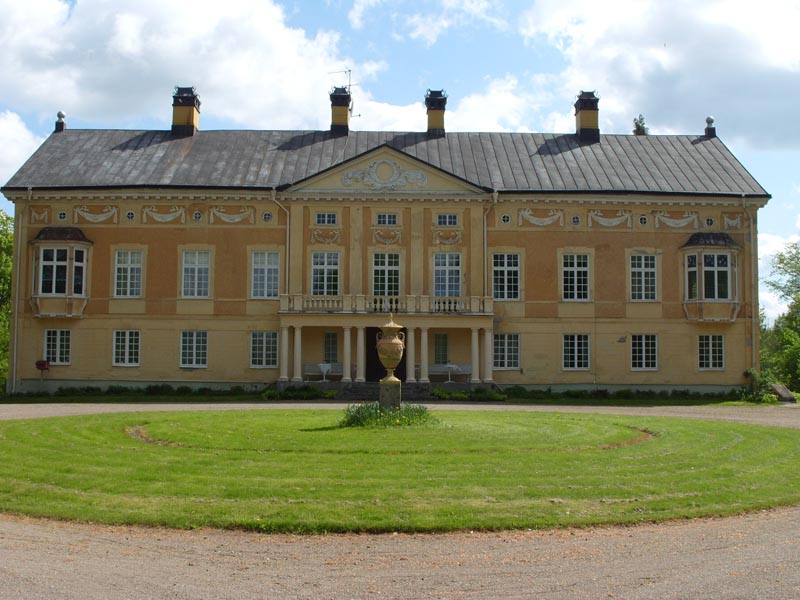Trystorp Manor on:
[Wikipedia]
[Google]
[Amazon]
 Trystorp is a Swedish
Trystorp is a Swedish
Slott till salu för 60 miljoner
Läst 5 juli 2010 To the south of the château, there is a
 Trystorp is a Swedish
Trystorp is a Swedish estate
Estate or The Estate may refer to:
Law
* Estate (law), a term in common law for a person's property, entitlements and obligations
* Estates of the realm, a broad social category in the histories of certain countries.
** The Estates, representat ...
and château
A château (; plural: châteaux) is a manor house or residence of the lord of the manor, or a fine country house of nobility or gentry, with or without fortifications, originally, and still most frequently, in French-speaking regions.
No ...
in Lekeberg, Närke
Närke () is a Swedish traditional province, or ''landskap'', situated in Svealand in south central Sweden. It is bordered by Västmanland to the north, Södermanland to the east, Östergötland to the southeast, Västergötland to the southwe ...
, Sweden. It includes 687 ha land.Na.se (2009-07-17Slott till salu för 60 miljoner
Läst 5 juli 2010 To the south of the château, there is a
nature reserve
A nature reserve (also known as a wildlife refuge, wildlife sanctuary, biosphere reserve or bioreserve, natural or nature preserve, or nature conservation area) is a protected area of importance for flora, fauna, or features of geological or ...
which is open to the public, with a rich fauna and many old oak
An oak is a tree or shrub in the genus ''Quercus'' (; Latin "oak tree") of the beech family, Fagaceae. There are approximately 500 extant species of oaks. The common name "oak" also appears in the names of species in related genera, notably ''L ...
s.
The estate was established by Biskop Kort Rogge
Kort Rogge ( 1425 — 5 April 1501), also known as Rogge Kyle, Konrad Rogge, Cort Rogge, Conradus Roggo gothus and Conradus Roggo de Holmis, was a Swedish bishop, member of the Privy Council of Sweden, and humanist.
Background and studies
The fir ...
in 1495, who bought land in the area. The Livonia
Livonia ( liv, Līvõmō, et, Liivimaa, fi, Liivinmaa, German and Scandinavian languages: ', archaic German: ''Liefland'', nl, Lijfland, Latvian and lt, Livonija, pl, Inflanty, archaic English: ''Livland'', ''Liwlandia''; russian: Ли ...
n nobleman Henrik von Falkenberg was subsequently awarded Trystorp as a fief
A fief (; la, feudum) was a central element in medieval contracts based on feudal law. It consisted of a form of property holding or other rights granted by an overlord to a vassal, who held it in fealty or "in fee" in return for a form of f ...
. The Falkenberg family owned the estate from 1603 to 1816, when it was sold to publisher N.M. Lindh. His heirs sold the estate to businessman Julius Lindström in 1868. From 1914 to 1918, it was owned by Christopher de Paus
Christopher Tostrup Paus, Count of Paus (10 September 1862 – 10 September 1943) was a Norwegian landowner, heir to the timber firm Tostrup & Mathiesen, papal chamberlain and count, known as philanthropist, art collector and socialite in the ...
. In 1937, it was acquired by Astrid Ziebach de Jonquiéres, whose heirs still own it. It was announced for sale in 2009.{{Cite web, url=http://www.realtid.se/ArticlePages/200906/17/20090617122027_Realtid039/20090617122027_Realtid039.dbp.asp, title = Utropspris: 60 miljoner
In the 16th century, King Charles IX of Sweden
Charles IX, also Carl ( sv, Karl IX; 4 October 1550 – 30 October 1611), reigned as King of Sweden
The monarchy of Sweden is the monarchical head of state of Sweden,See the #IOG, Instrument of Government, Chapter 1, Article 5. which is a c ...
was a frequent guest at Trystorp.
References